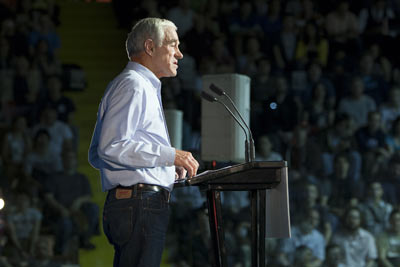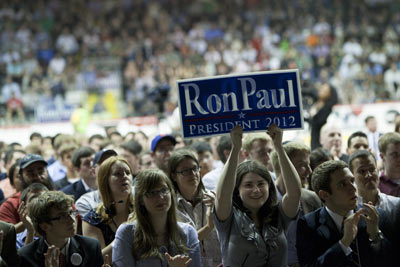Ron Paul claims 'big brother government' is eroding rights
By Michelle Spektor


The resounding theme of Republican presidential candidate Ron Paul, addressing a standing-room-only crowd of 4,400 in Cornell's Lynah Rink April 19, was maintaining liberty despite a "big brother government" and its "enemies of liberty" who, he said, overregulate and overspend.
"It seems like we are among friends of liberty in this crowd tonight," said Paul, a Texas congressman at his final campaign event in New York state before next week's Republican primary. In his almost hourlong "town hall meeting," he repeatedly criticized government policies -- drawing thunderous applause, cheers and chants of "President Paul!" from the audience.
"We do not get our liberties from our government; we have liberty in spite of the government," said Paul, who asserted that liberty "must be individual." If elected to the White House, he promised to cut government spending, repeal executive orders and eliminate 40,000 laws that he believes infringe on civil liberties. Among these are the Patriot Act and the National Defense Authorization Act (which specifies budget and spending of the U.S. Department of Defense), he said.
Paul also reiterated his position against the war on street drugs. The decision to use these drugs, he said, should be as individual as the decision to drink raw milk.
"It's up to individuals to run their lives as they choose," said Paul. "If you have a right to your life, you have a right to your social values, your church values and all your habits. You have a right to keep your money and spend the money that you have, waste your money if you want to."
Paul also called for dismantling the Federal Reserve System and voiced concerns about the mounting national debt and the value of the U.S. dollar. In response, the audience enthusiastically chanted, "End the Fed!"
The audience also responded favorably to Paul's challenges against "American exceptionalism" and the United States' role as a "police of the world."
"There are a lot of great things about this country, but the best way to create our exceptionalism that we have and can have is to set a good standard and make the world emulate us and not use force," said Paul.
He assured the crowd that his campaign is not about what he wants to do as president, but rather about what he does not want to do, and noted that both liberals and conservatives can and should unify around the preservation of liberty.
Paul also acknowledged the new generation of young people who support libertarian ideals. "As the young people come in, we can change this country," said Paul. "There is no doubt about it."
He commended them for speaking out against the Stop Online Piracy Act (SOPA) and encouraged them to continue using the Internet to prevent the passage of laws that violate civil liberties.
With "the energy coming from the young people, along with the Internet," said Paul, "we have a great team going for the cause."
After the speech, which garnered a standing ovation, Paul held a brief press conference, where he expressed his view that pumping money into medicine, education or housing doesn't improve the system but just causes higher prices.
The event was organized by Youth for Ron Paul, the Cornell Libertarians and the Cornell Republicans.
Michelle Spektor '12 is a writing intern for the Cornell Chronicle.
Media Contact
Get Cornell news delivered right to your inbox.
Subscribe